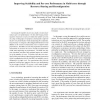114 search results - page 4 / 23 » Performance and Overhead in a Hybrid Reconfigurable Computer |
VLSID
2009
IEEE
14 years 8 months ago
2009
IEEE
Increasing the number of cores in a multi-core processor reduces per-core performance. On the other hand, providing more resources to each core limits the number of cores on a chi...
FCCM
1998
IEEE
13 years 11 months ago
1998
IEEE
One of the major overheads in reconfigurable computing is the time it takes to reconfigure the devices in the system. This overhead limits the speedups possible in this exciting n...
ICCAD
2007
IEEE
14 years 4 months ago
2007
IEEE
—In this paper, we introduce a novel reconfigurable architecture, named 3D nFPGA, which utilizes 3D integration techniques and new nanoscale materials synergistically. The propos...
DATE
2006
IEEE
13 years 11 months ago
2006
IEEE
In this paper, we propose two FPGA-area allocation algorithms based on profiling results for reducing the impact on performance of dynamic reconfiguration overheads. The problem o...
FPGA
2008
ACM
13 years 9 months ago
2008
ACM
We present HybridOS, a set of operating system extensions for supporting fine-grained reconfigurable accelerators integrated with general-purpose computing platforms. HybridOS spe...


